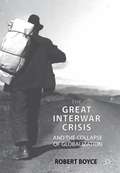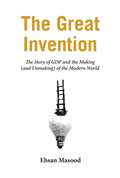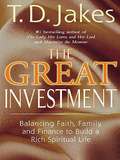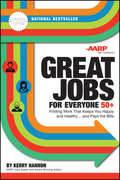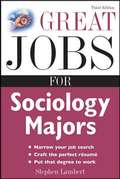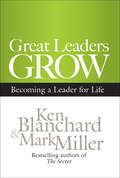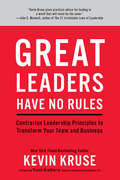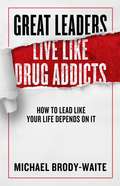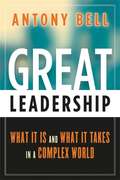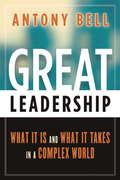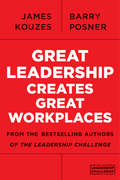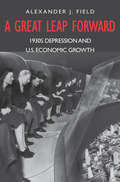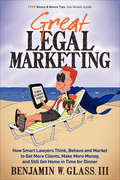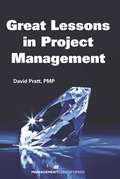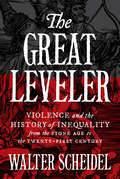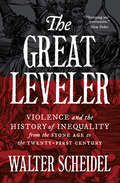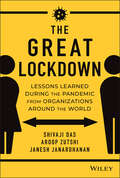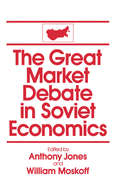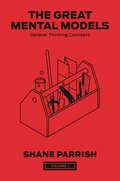- Table View
- List View
The Great Interwar Crisis and the Collapse of Globalization
by Robert BoyceChallenging the standard narrative of Interwar International History, this account establishes the causal relationship between the global political and economic crises of the period, and offers a radically new look at the role of ideology, racism and the leading liberal powers in the events between the First and Second World Wars.
The Great Invention: The Story of GDP and the Making and Unmaking of the Modern World
by Ehsan MasoodThe fascinating story of one of the twentieth-century's most influential and dangerously addictive ideas, told through the lives of those who invented it. The world's principal measure of the health of economies is gross domestic product, or GDP: the sum of what all of us spend every day, from the contents of our weekly shopping to large capital spending by businesses. GDP also includes the myriad things that our governments pay for, from libraries and road-line painting to naval dockyards and nuclear weapons. The Great Invention reveals how in just a few decades GDP became the world's most powerful formula: how six algebraic symbols forged in the fires of the 1930's economic crisis helped Europe and America prosper, how the remedy now risks killing the patient it once saved, and how this fundamentally flawed metric is creating the illusion of global prosperity--and why many world leaders want to be able to ignore it but so far remain powerless to do so. Drawing on interviews, firsthand accounts, and previously neglected source materials, The Great Invention takes readers on a journey from Capitol Hill to Whitehall--on the trail of theories made in Cambridge, tested in Karachi, and designed for global application--into the minds of unworldly geniuses seduced by the allure of power and the demands of politics.
The Great Investment: Balancing. Faith, Family and Finance to Build a Rich Spiritual Life
by T. D. JakesBishop T. D. Jakes, preacher, author, motivator, and entrepreneur, is one of the most respected and influential voices in the country today. Now, in The Great Investment, Bishop Jakes gives readers the blueprint for balanced successful living. He explains how the triad of faith, family and finance is the cornerstone of a life of moral success--success based on God's plan. Faith is the foundation of all that we want to achieve. Bishop Jakes explores the impact faith can have in healing and restoring quality of life to those whose history has caused them setbacks. Family is the anchor, keeping us grounded, supporting us, and allowing us to stay focused. A healthy family sustains us while giving meaning to our endeavors. Finally, and no less crucial, Finance is the often misunderstood factor in the equation for success. Bishop Jakes removes the veil from this frequently neglected topic, and shows that, not only is it not profane to focus on this area, it is essential. Bishop T. D. Jakes's goal is to empower every woman and man. With this new book he provides the tools for us to chart a course for success and accomplish everything that God has promised. This is truly a book of our time.
Great Jobs for Everyone 50 +, Updated Edition: Finding Work That Keeps You Happy and Healthy...and Pays the Bills
by Kerry HannonYou can find profitable, fulfilling work after 50! Kerry Hannon's national bestseller, Great Jobs for Everyone 50+, has become the job-hunting bible for people in their forties, fifties, and beyond. With her no-nonsense style, Hannon shows where the opportunities are and how to get them. In this completely revised edition, Hannon offers twice as many jobs and brand-new material to market your skills in today’s job market, with expert tips on revamping a résumé, networking, interviewing like a pro, building a social media platform to stand out in the crowd, and much more. Whether you took early retirement, were laid off, are seeking a job that you will love, need supplemental income, or want to stay engaged and make a difference by giving back with your talents, Hannon’s book is an essential tool. The truth is that many companies are looking for candidates with your experience, expertise, and maturity. The trick is finding those employers—and going into your search with a positive attitude and realistic expectations. This completely updated Great Jobs shows you how to avoid common job-seeking mistakes and helps you find your ideal employment in today’s landscape.
Great Jobs for Sociology Majors (Third Edition)
by Stephen LambertGreat Jobs books help students and recent college graduates explore the possibilities in their majors and provides guidance on how to present a major as a workplace asset during an interview.
Great Leaders Grow: Becoming a Leader for Life
by Ken Blanchard Mark MillerBy the bestselling authors of The Secret (over 350,000 copies sold): the legendary Ken Blanchard and Mark Miller, a top executive at one of the most successful restaurant chains in the country Identifies the specific ways leaders must grow--on the job and off--to remain inspiring and effective Written for both established leaders looking to ensure their continued effectiveness and those who aspire to leadership Successful leaders don't rest on their laurels. Leadership must be a living process, not a title on a business card, and life means growth. As Ken Blanchard and Mark Miller write in the introduction, "the path to increased influence, impact, and leadership effectiveness is paved with personal growth.... Our capacity to grow determines our capacity to lead. It's really that simple." Great Leaders Grow shows leaders and aspiring leaders precisely which areas to focus on so they can remain effective throughout their lives. As the book opens, Debbie Brewster, an accomplished leader herself, becomes a mentor to Blake, her late mentor's son, as he begins his career. Debbie tells Blake, "How well you and I serve will be determined by the decision to grow or not. Will you be a leader who is always ready to face the next challenge? Or will you be a leader who tries to apply yesterday's solutions to today's problems? The latter will ultimately fail. The difference: the decision to grow. And not a short-term decision but a decision to grow throughout your career and throughout your life. This single decision is a game changer for leaders." Over the next several weeks Debbie reveals what this means in practical terms. She and Blake explore four ways that leaders must continue to grow, both on the job and off, because who you are as a leader is inextricably connected to who you are as a person. Whether you're a CEO or an entry-level employee, you'll be inspired to reflect on your own life and to design your own unique long-term growth plan, leading to not only continuing professional success but personal fulfillment as well.
Great Leaders Have No Rules: Contrarian Leadership Principles to Transform Your Team and Business
by Kevin KruseAs a serial entrepreneur, Kevin Kruse has seen time and again that the leadership practices that actually work are the opposite of what is commonly taught and implemented. Close Your Open Door Policy shows how a contrarian approach can be a better, faster, and easier way to succeed as a leader. Chapter by chapter, Kruse focuses on a piece of popular wisdom, then shows with real-world case studies and quantitative research that the opposite approach will lead to better results, encouraging leaders to play favorites, stay out of meetings, and, of course, close their open doors.
Great Leaders Live Like Drug Addicts: How to Lead Like Your Life Depends on It
by Michael Brody-WaiteWhat if you learned that to lead well, you&’d need to live like a drug addict?During treatment for drug addiction, Michael Brody-Waite learned three principles that became the difference between life and death: Practice rigorous authenticity Surrender the outcome Do uncomfortable work Leaving rehab, Michael entered the workplace where he was shocked to see most business leaders doing what he had been taught would kill him. He began to see striking similarities between drug addiction and what he calls &“mask addiction.&” Leaders everywhere were hiding their authentic selves in order to get what they wanted. They were doing things like: Saying yes when they could say no Hiding their weaknesses Avoiding difficult conversations Holding back their unique perspectives Instead of chasing drugs, leaders were chasing professional, financial, and social success from behind a mask—to the detriment of themselves and the people around them. Thanks to his recovery, Michael&’s three principles gave him an unlikely competitive advantage throughout his career, resulting in a level of success unexpected for a &“drug addict.&” In Great Leaders Live Like Drug Addicts, Michael explains what drug addicts do to recover and provides a step-by-step program you can use to break free from your mask addiction to thrive in both work and life. He equips you with the tools you need to live and lead mask-free—tools to enable you to stop following others, lead yourself, and become one of the dynamic, growing, authentic leaders this world desperately needs.
Great Leaders Move Us: An Introduction to Resonant Leadership and Why It Matters
by Richard Boyatzis Annie MckeeLeaders today face unprecedented challenges that can result in a vicious cycle of stress, pressure, sacrifice, and dissonance. This chapter describes what it takes to become a resonant leader--someone who inspires and gets results--capable of leading teams and organizations through the dangerous and shifting terrain of an uncertain age.
Great Leadership: What It Is and What It Takes in a Complex World
by Antony BellThe demand for leadership that is both competent and principled is essential to a business or an organization. Leadership development expert, Antony Bell, offers an easy workable template involving knowledge, skill and talent combined with the inner qualities of a leader that drive noble actions. Great Leadership is for any leader looking to take charge of his or her growth.This book compiles the research and writings of eminent thinkers like: Rosabeth Moss Kanter, Warren Bennis, Daniel Goleman and John Kotter in order to make leadership development as simple as possible. Bell introduces his "Three Dimensions of Leadership" model, and plenty of practical tools to help assess how to achieve leadership superiority when directing organizations, operations and people.By integrating leadership development with organizational development, Bell demonstrates the results when employees align with the organization's mission, commit to improving their productivity and collectively contribute to improving the corporate bottom line..
Great Leadership: What It Is and What It Takes in a Complex World
by Antony BellDistilling the wisdom of the past with an eye toward the future, Great Leadership cuts through the complexity of leading organizations, operations, and people to make leadership development manageable and greatness attainable. Whether you are looking to lay a solid foundation for a lifetime of great leadership or searching for a curriculum to guide your self-development, Antony Bell has mapped out a journey of discovery to help you uncover what drives your leadership style and do what it takes to practice leadership that is both noble and competent.
Great Leadership Creates Great Workplaces
by James M. Kouzes Barry Z. PosnerHow can you inspire your employees to the high levels of engagement that drive strong results across the board? Drawing on over 30 years of research and data from more than two million constituents around the world, Jim Kouzes and Barry Posner, the bestselling authors of The Leadership Challenge, expand on their work with The Five Practices of Exemplary Leadership to create a new metric--Positive Workplace Attitudes--addressing how leaders affect employee engagement. Their research shows how positive feelings about being part of the workplace strongly influence people's willingness to apply discretionary effort to their work. People put forth much more effort for their best leaders and very little for their worst leaders. Leaders who more frequently exhibit exemplary practices foster engagement and inspire people to go from acceptable to good and even to great.Filled with new findings from Kouzes and Posner's original research, Great Leadership Creates Great Workplaces expands the reach of The Leadership Challenge to address pressing, critical issues around employee engagement, and how leaders can improve it to outperform the competition.
Great Leadership in a World of Ongoing Duress: The Three Must-Have Capabilities of Twenty-First-Century CEOs
by Justin MenkesWhat qualities make great leaders able to navigate the turbulent and ever-changing business environment that is the new normal, performing at their best and also bringing out the best in those they lead? Justin Menkes, a psychologist and executive assessment expert who works with the world's top CEOs, has made an in-depth study of the differences between leaders who fail and those who have shown remarkable success and staying power. In this chapter, Menkes redefines leadership in today's context and introduces the three attributes you must develop in yourself if you aspire to the top position in any organization: realistic optimism, subservience to purpose, and finding order in chaos. Inspiring testimonials from CEOs Larry Bossidy (Honeywell), Dave Dillon (Kroger supermarkets), Herb Kelleher (Southwest Airlines), and others demonstrate how today's great leaders create organizations that harness the utmost effort and resiliency from workers of every rank, creating the only kind of organization that can survive amid ever-escalating competition. This chapter was originally published as the Introduction to "Better Under Pressure: How Great Leaders Bring Out the Best in Themselves and Others."
A Great Leap Forward: 1930s Depression and U.S. Economic Growth
by Alexander J. FieldThis bold re-examination of the history of U.S. economic growth is built around a novel claim, that productive capacity grew dramatically across the Depression years (1929-1941) and that this advance provided the foundation for the economic and military success of the United States during the Second World War as well as for the golden age (1948-1973) that followed. Alexander J. Field takes a fresh look at growth data and concludes that, behind a backdrop of double-digit unemployment, the 1930s actually experienced very high rates of technological and organizational innovation, fueled by the maturing of a privately funded research and development system and the government-funded build-out of the country's surface road infrastructure. This significant new volume in the Yale Series in Economic and Financial History invites new discussion of the causes and consequences of productivity growth over the last century and a half and on our current prospects.
Great Legal Marketing: How Smart Lawyers Think, Behave and Market to Get More Clients, Make More Money, and Still Get Home in Time for Dinner
by Benjamin W. Glass IIIOther lawyers are living extraordinary lives and their success can be discovered and modeled! Who wants to spend 60 to 70 hours per week in the office? What lawyer would love nothing more than to be accessible to his or her clients 24 hours a day, 7 days a week? "Great Legal Marketing" will show you how you can implement proven strategies into your marketing campaign that will make your ideal clients come knocking on your door. "Great Legal Marketing" will dramatically alter the way you view the marketing of your law practice. Ben Glass illustrates, in an easy-to-follow format, how you can: Improve your mindset about marketing and its purpose, Build a valuable database of past, current and future clients, Cultivate a group of followers who will send business your way, Create a system that puts your marketing on auto-pilot, Follow the footsteps of other successful lawyers who have &“figured it out&”, Integrate various marketing techniques into your practice...today, and Avoid the common pitfalls of lawyer marketing. Not only does "Great Legal Marketing" incorporate Ben&’s valuable advice, there are also guest chapters written by people who are in the marketing trenches on a daily basis. You will be able to learn various perspectives on marketing, including what works and what does not. Don&’t leave marketing to chance. Let "Great Legal Marketing" guide you on the path toward a profitable law practice that doesn&’t require you to spend each and every day in the office!
Great Lessons in Project Management
by David Pratt PmpLearn from Other Projects to Avoid Pitfalls on Your Projects!Projects fail at an alarming rate, whether they are information technology, training, construction, or policy development projects. No matter the focus, each year we experience an abundance of challenged projects that either require super-human effort to resuscitate or die an untimely death.Great Lessons in Project Management is a treasure trove of lessons learned from troubled projects—and from projects that went well. This collection of stories describes the events surrounding a particular challenge a project manager faced or a tool that another used effectively. Project managers of all types of projects can draw on these stories to validate their own good practices and to avoid the pitfalls so many have encountered on their projects.
The Great Leveler: Capitalism and Competition in the Court of Law
by Brett ChristophersBrett Christophers shows how laws help capitalism maintain a crucial balance between competition and monopoly. When monopolistic forces dominate, antitrust law discourages the growth of corporations and restores competitiveness. When competition becomes dominant, intellectual property law protects corporate assets and encourages investment.
The Great Leveler: Violence and the History of Inequality from the Stone Age to the Twenty-First Century
by Walter ScheidelAre mass violence and catastrophes the only forces that can seriously decrease economic inequality? To judge by thousands of years of history, the answer is yes. Tracing the global history of inequality from the Stone Age to today, Walter Scheidel shows that inequality never dies peacefully. Inequality declines when carnage and disaster strike and increases when peace and stability return. The Great Leveler is the first book to chart the crucial role of violent shocks in reducing inequality over the full sweep of human history around the world. Ever since humans began to farm, herd livestock, and pass on their assets to future generations, economic inequality has been a defining feature of civilization. Over thousands of years, only violent events have significantly lessened inequality. The "Four Horsemen" of leveling—mass-mobilization warfare, transformative revolutions, state collapse, and catastrophic plagues—have repeatedly destroyed the fortunes of the rich. Scheidel identifies and examines these processes, from the crises of the earliest civilizations to the cataclysmic world wars and communist revolutions of the twentieth century. Today, the violence that reduced inequality in the past seems to have diminished, and that is a good thing. But it casts serious doubt on the prospects for a more equal future. An essential contribution to the debate about inequality, The Great Leveler provides important new insights about why inequality is so persistent—and why it is unlikely to decline anytime soon.
The Great Leveler: Violence and the History of Inequality from the Stone Age to the Twenty-First Century (The Princeton Economic History of the Western World #114)
by Walter ScheidelAre mass violence and catastrophes the only forces that can seriously decrease economic inequality? To judge by thousands of years of history, the answer is yes. Tracing the global history of inequality from the Stone Age to today, Walter Scheidel shows that it never dies peacefully. The Great Leveler is the first book to chart the crucial role of violent shocks in reducing inequality over the full sweep of human history around the world. The “Four Horsemen” of leveling—mass-mobilization warfare, transformative revolutions, state collapse, and catastrophic plagues—have repeatedly destroyed the fortunes of the rich. Today, the violence that reduced inequality in the past seems to have diminished, and that is a good thing. But it casts serious doubt on the prospects for a more equal future. An essential contribution to the debate about inequality, The Great Leveler provides important new insights about why inequality is so persistent—and why it is unlikely to decline anytime soon.
The Great Life Redesign: Change How You Work, Live How You Dream And Make It Happen Today
by Caroline CameronNever before have Australians worked so hard yet felt so unhappy. With anxiety rising at unprecedented levels, now is the time to stop and consider whether there could be another way to live. We renovate our houses, but what about our lives? The Great Life Redesign is an inspirational yet practical guidebook to help you reshape the life you have to create one you'll love. The Great Life Redesign is an inspiring guidebook to help you reshape the life you have to create one you'll love. The practical, simple to apply techniques and inspiring personal stories included in this book will show you how. Learn the secrets of one-on-one coaching with Caroline Cameron, an executive, career and lifestyle coach. Based on her experiences working with hundreds of professionals across Australia and beyond, she steps you through the process of designing a blue print for the life you really want. Key features: Helps the reader to create a blue print for making real and actionable change, including career, relationships, wealth and finances, health, home, personal growth, environment, leisure and spirituality. Use to instantly repair parts of your life that could be better or as a step-by-step plan for a major life renovation. Includes practical, simple to apply techniques and inspiring personal stories Written for professionals, middle income, burnt-out city slickers, corporate refugees, disillusioned 30-somethings, mid life crisis sufferers, baby boomers whose super and retirement dreams evaporated in the GFC, dedicated parents who want the best for their kids, and anyone who suspects that there's more to life but don't know what it is or how to get it.
The Great Lockdown: Lessons Learned During the Pandemic from Organizations Around the World
by Shivaji Das Aroop Zutshi Janesh JanardhananA collection of insider accounts describing the organizational impact of COVID-19 In The Great Lockdown: Lessons Learned During the Pandemic from Organizations Around the Globe, expert strategists Shivaji Das, Aroop Zutshi , and Janesh Janardhanan deliver an insightful exploration of this once-in-a-lifetime event to unearth invaluable learnings for the future. Told through the experiences of CXOs at billion-dollar companies, star start-ups, and non-profits from around the world, the book chronicles the ups and downs of sophisticated organizations as they navigated the COVID-19 crisis through initiatives impacting people, processes, and technology. Revealing case studies contributed by the CXOs of companies spanning multiple geographies - from the USA to Iran, Uganda to Hong Kong, and multiple sectors – social media, technology, aviation, luxury retail, healthcare, etc. Incisive analyses of the techniques and strategies that worked—or didn’t—for organizations during the COVID-19 pandemic, covering the role and evolution of leadership, organizational culture, innovation and digitization Practical guidance for business leaders to apply to their own firms in times of great economic upheaval: the next pandemic, climate disasters, cyber-attacks The leaders contributing their organization's survival and revival stories include those from Julius Baer, SAP, Terumo, IndiGrid, Tapsi, Fonterra, Hornet Networks, Globalization Partners, beCuriou, GoGoX, Abacus Pharma, Real Wear Inc, SOS Children's Villages, Bangalore International Airport, and A Lange & Sohne. Perfect for executives, managers, and other business leaders, The Great Lockdown is an invaluable addition to the libraries of anyone interested in case studies of corporate resilience and endurance in the face of unprecedented economic challenges.
The Great Market Debate in Soviet Economics: An Anthology
by David M Jones William MoskoffThe most agonizing and protracted of all the Soviet reform debates has been the debate over economic reform. This anthology of essays and roundtables from party, professional and literary journals surveys the key issues in the market debate.
Great Marketing: Bullet Guides
by Fabienne ReynoldsOpen this book and you will Communicate creatively Beat the competition Create brilliant strategy Really know your market
The Great Mental Models, Volume 1: General Thinking Concepts (The Great Mental Models Series #1)
by Shane Parrish Rhiannon BeaubienDiscover the essential thinking tools you&’ve been missing with The Great Mental Models series by Shane Parrish, New York Times bestselling author and the mind behind the acclaimed Farnam Street blog and &“The Knowledge Project&” podcast.This first book in the series is your guide to learning the crucial thinking tools nobody ever taught you. Time and time again, great thinkers such as Charlie Munger and Warren Buffett have credited their success to mental models–representations of how something works that can scale onto other fields. Mastering a small number of mental models enables you to rapidly grasp new information, identify patterns others miss, and avoid the common mistakes that hold people back.The Great Mental Models: Volume 1, General Thinking Concepts shows you how making a few tiny changes in the way you think can deliver big results.Drawing on examples from history, business, art, and science, this book details nine of the most versatile, all-purpose mental models you can use right away to improve your decision making and productivity.This book will teach you how to:Avoid blind spots when looking at problems.Find non-obvious solutions. Anticipate and achieve desired outcomes. Play to your strengths, avoid your weaknesses, … and more.The Great Mental Models series demystifies once elusive concepts and illuminates rich knowledge that traditional education overlooks. This series is the most comprehensive and accessible guide on using mental models to better understand our world, solve problems, and gain an advantage.
